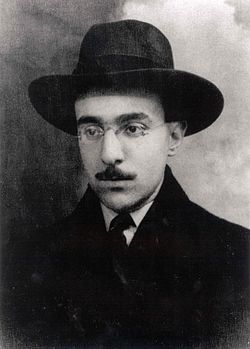Fernando Pessoa Quote
Perhaps it's my destiny to remain a bookkeeper forever, and for poetry and literature to remain simply butterflies that alight on my head and underline my own ridiculousness by their very beauty. In the future I'll be living quietly in a little house somewhere, enjoying a peaceful existence not writing the book I'm not writing now and, so as to continue not doing so, I will use different excuses to the ones I use now to avoid actually confronting myself.
Fernando Pessoa
Perhaps it's my destiny to remain a bookkeeper forever, and for poetry and literature to remain simply butterflies that alight on my head and underline my own ridiculousness by their very beauty. In the future I'll be living quietly in a little house somewhere, enjoying a peaceful existence not writing the book I'm not writing now and, so as to continue not doing so, I will use different excuses to the ones I use now to avoid actually confronting myself.
Related Quotes
About Fernando Pessoa
Fernando António Nogueira de Seabra Pessoa (; Portuguese: [fɨɾˈnɐ̃du pɨˈsoɐ]; 13 June 1888 – 30 November 1935) was a Portuguese poet, writer, literary critic, translator, and publisher. He has been described as one of the most significant literary figures of the 20th century and one of the greatest poets in the Portuguese language. He also wrote in and translated from English and French.
Pessoa was a prolific writer both in his own name and approximately seventy-five other names, of which three stand out: Alberto Caeiro, Álvaro de Campos, and Ricardo Reis. He did not define these as pseudonyms because he felt that this did not capture their true independent intellectual life and instead called them heteronyms, a term he invented. These imaginary figures sometimes held unpopular or extreme views.
Pessoa was a prolific writer both in his own name and approximately seventy-five other names, of which three stand out: Alberto Caeiro, Álvaro de Campos, and Ricardo Reis. He did not define these as pseudonyms because he felt that this did not capture their true independent intellectual life and instead called them heteronyms, a term he invented. These imaginary figures sometimes held unpopular or extreme views.
